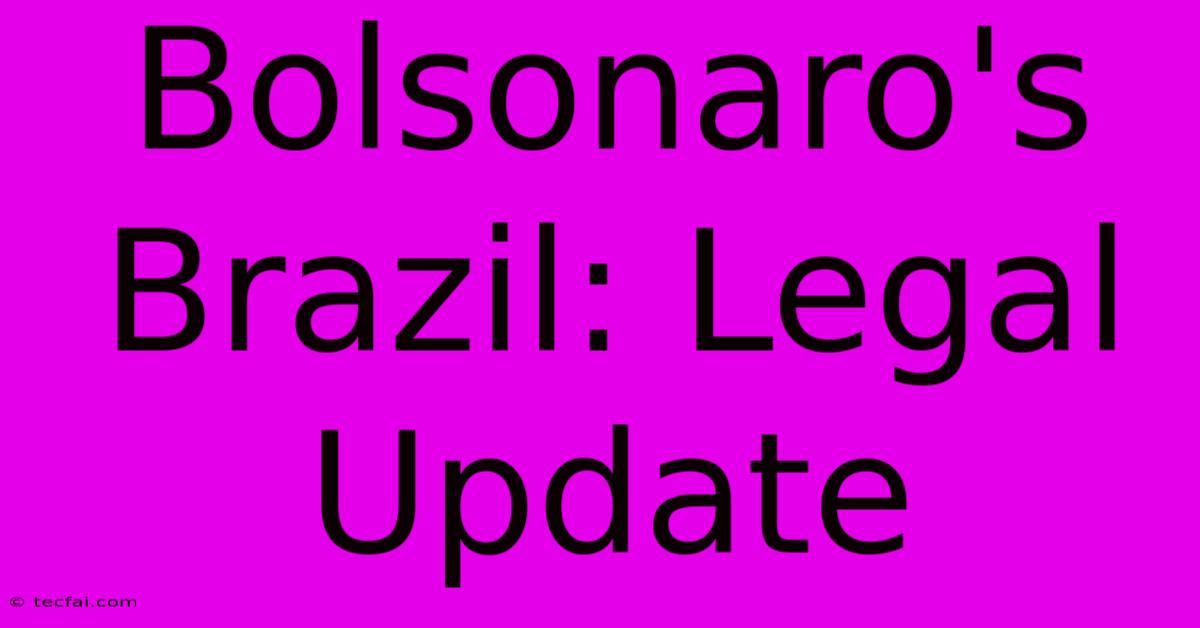Bolsonaro's Brazil: Legal Update

Discover more detailed and exciting information on our website. Click the link below to start your adventure: Visit Best Website tecfai.com. Don't miss out!
Table of Contents
Bolsonaro's Brazil: A Legal Landscape in Flux
Jair Bolsonaro's presidency (2019-2022) left an undeniable mark on Brazil's legal and political systems. His administration, characterized by a strong emphasis on law and order and a conservative social agenda, implemented significant changes across various sectors. Understanding these changes is crucial for anyone navigating business, politics, or social issues within Brazil. This article provides a concise legal update focusing on key areas impacted during his tenure.
Key Legislative Changes under Bolsonaro
Bolsonaro's time in office saw considerable legislative activity, often reflecting his administration's priorities. Here are some notable areas:
-
Arms Control: One of the most significant shifts was in gun control. Bolsonaro's administration loosened restrictions on firearm ownership, leading to a substantial increase in the number of registered weapons. This sparked considerable debate and concern regarding public safety and potential increases in gun violence. The long-term legal and societal impact of these changes remains a subject of ongoing discussion and research.
-
Environmental Regulations: Controversially, Bolsonaro's government faced intense scrutiny for its policies regarding environmental protection. Critics pointed to increased deforestation in the Amazon rainforest and a weakening of environmental enforcement. Legal challenges to these policies have been, and continue to be, significant. The legacy of these changes on Brazil's environment and international standing is a matter of ongoing legal and political debate.
-
Privatization: The Bolsonaro administration pursued a policy of privatization, aiming to reduce the size and scope of state-owned enterprises. This involved significant legislative changes and legal processes for the sale of assets in various sectors. The success and long-term consequences of this privatization drive are still being assessed.
-
Social Security Reform: A major legislative achievement was the overhaul of Brazil's social security system. The reforms aimed to address long-term fiscal sustainability issues. The legal framework underpinning these changes was complex, impacting pension benefits and retirement ages.
Judicial and Institutional Impacts
Beyond legislative changes, the Bolsonaro era impacted Brazil's judicial and institutional landscape.
-
Supreme Court Dynamics: The Supreme Court faced numerous challenges during this period, dealing with high-profile cases related to corruption, human rights, and environmental issues. These cases shaped the Court's role in the broader political context and its ongoing relationship with the executive branch. Understanding these dynamics is vital for assessing the longer-term influence on Brazilian jurisprudence.
-
Political Polarization: Bolsonaro's presidency significantly heightened political polarization in Brazil. This polarization manifested in various legal challenges and disputes, often impacting the interpretation and enforcement of laws. This environment increased the complexity and uncertainty for legal practitioners and businesses operating in Brazil.
Looking Ahead: Legal Uncertainty and Ongoing Debates
The legal consequences of the Bolsonaro administration’s actions continue to unfold. Numerous legal challenges and investigations remain in progress, addressing issues ranging from corruption allegations to environmental damages. The long-term implications for Brazil’s legal and political systems are yet to be fully determined. Careful monitoring of ongoing legal proceedings and policy shifts will be crucial for understanding the evolving legal landscape.
Keywords: Bolsonaro, Brazil, Legal Update, Law, Politics, Legislation, Supreme Court, Privatization, Environmental Regulations, Arms Control, Social Security Reform, Judicial Reform, Political Polarization, Legal Challenges, Brazilian Law, Post-Bolsonaro Brazil.
This article aims to provide a comprehensive overview. For specific legal advice or deeper analysis of particular issues, consulting legal professionals specializing in Brazilian law is recommended.

Thank you for visiting our website wich cover about Bolsonaro's Brazil: Legal Update. We hope the information provided has been useful to you. Feel free to contact us if you have any questions or need further assistance. See you next time and dont miss to bookmark.
Featured Posts
-
Father Cautiously Optimistic On Jon Benet Case
Nov 26, 2024
-
West Ham Vs Newcastle Areolas Chances
Nov 26, 2024
-
Icon Wealth Acquires Tjx Shares
Nov 26, 2024
-
Drake Vs Umg And Spotify Chart Inflation
Nov 26, 2024
-
Gukesh Loses To Ding Game One
Nov 26, 2024
